Repair help
Washing Machine Spin Slowly: 5+ Reasons and Solutions
AZparts Team
Updated on July 11, 2025
7 min read
Is your washing machine spinning slower than usual? A slow spin cycle can lead to soaking wet clothes, longer drying times, and possible damage to your appliance. Common causes include a worn-out belt, motor issues, or a faulty control board. In this article, AZParts breaks down the most likely reasons your washer is spinning slowly and how you can fix it whether with simple DIY steps or by replacing key parts.

1. Understanding The Role of the Spin Cycle
The spin cycle is the powerhouse finale of your washer’s routine, designed to pull water out of your laundry through rapid, high-speed spinning. Using centrifugal force, the drum pushes moisture out of fabrics and drains it away, leaving your clothes significantly drier.
The spin cycle rapidly extracts water from clothes, helping speed up drying, reduce wrinkles, and improve laundry efficiency overall. By removing excess moisture, it shortens drying times, lowers energy use, and protects your fabrics from heat damage, saving you time, money, and wear on your clothes.
2. Common Causes of Washing Machine Spinning Slow - How to fix
A washing machine that spins slowly can be frustrating and often leaves clothes wetter than they should be. This issue can result from a variety of factors, ranging from simple user errors to mechanical problems. Understanding the root cause is the first step toward a proper fix. Below are the most common reasons why your washing machine may not be spinning at full speed, starting with the most frequent issue found in everyday use.
2.1. Overloading or Unbalanced Load
Putting too many clothes into the washer or loading them unevenly can both lead to a slow or skipped spin cycle. When the drum is overcrowded or off-balance, the washer struggles to spin properly and sometimes stops spinning altogether to protect itself.
How to fix:
- Avoid overstuffing the drum, leave some space for the clothes to move freely.
- Make sure the load is evenly distributed. If you’re washing heavy or bulky items like blankets, balance them with a few smaller pieces.
- If the washer starts acting up mid-cycle, pause it and rearrange the clothes.
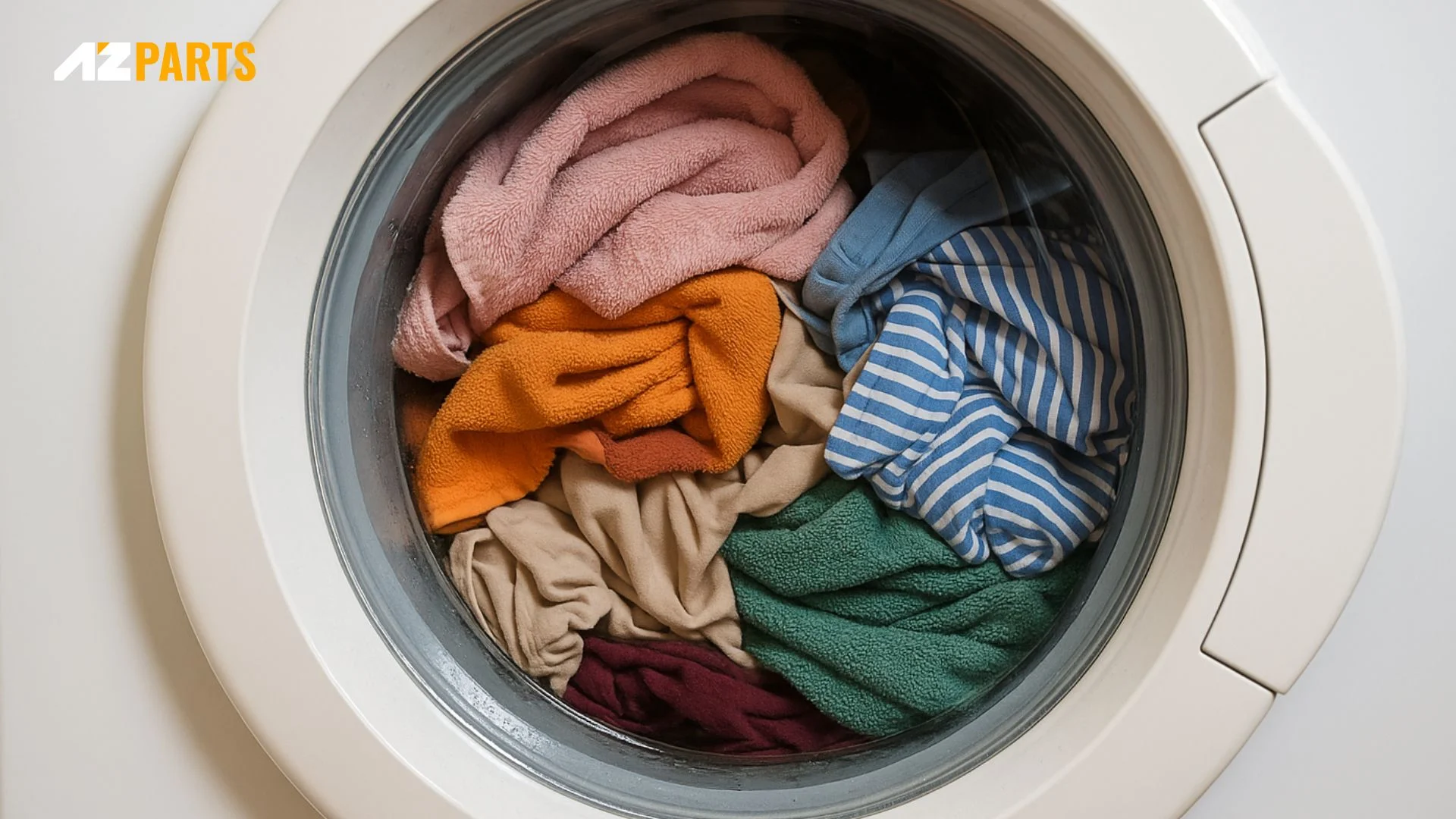
Too much laundry or off-balance load (Source: AZParts)
2.2. Draining System Issues
A slow or skipped spin cycle could point to a drainage problem. If water can’t drain properly, your washer won’t spin at full speed. Clogs in the washer drain pump or filter are often to blame caused by lint, hair, coins, tissues, or even sand from dirty clothes.
How to fix:
- For front-loading machines, open the drain filter (usually behind a small panel at the bottom front). Place a shallow tray underneath, some water may spill out. Remove any debris you find.
- For top-load or twin-tub machines, inspect the bottom drain hole and clear out any blockages.
- Regular cleaning of the drain pump and filter helps prevent clogs and keeps your washer spinning smoothly.
- If your washer isn’t spinning well, a clogged pump filter might be the reason. Lint, tissues, or small objects can block drainage and disrupt the spin cycle. Regular cleaning helps, and if your filter needs replacing, check out quality washer pump filter options at AZParts.
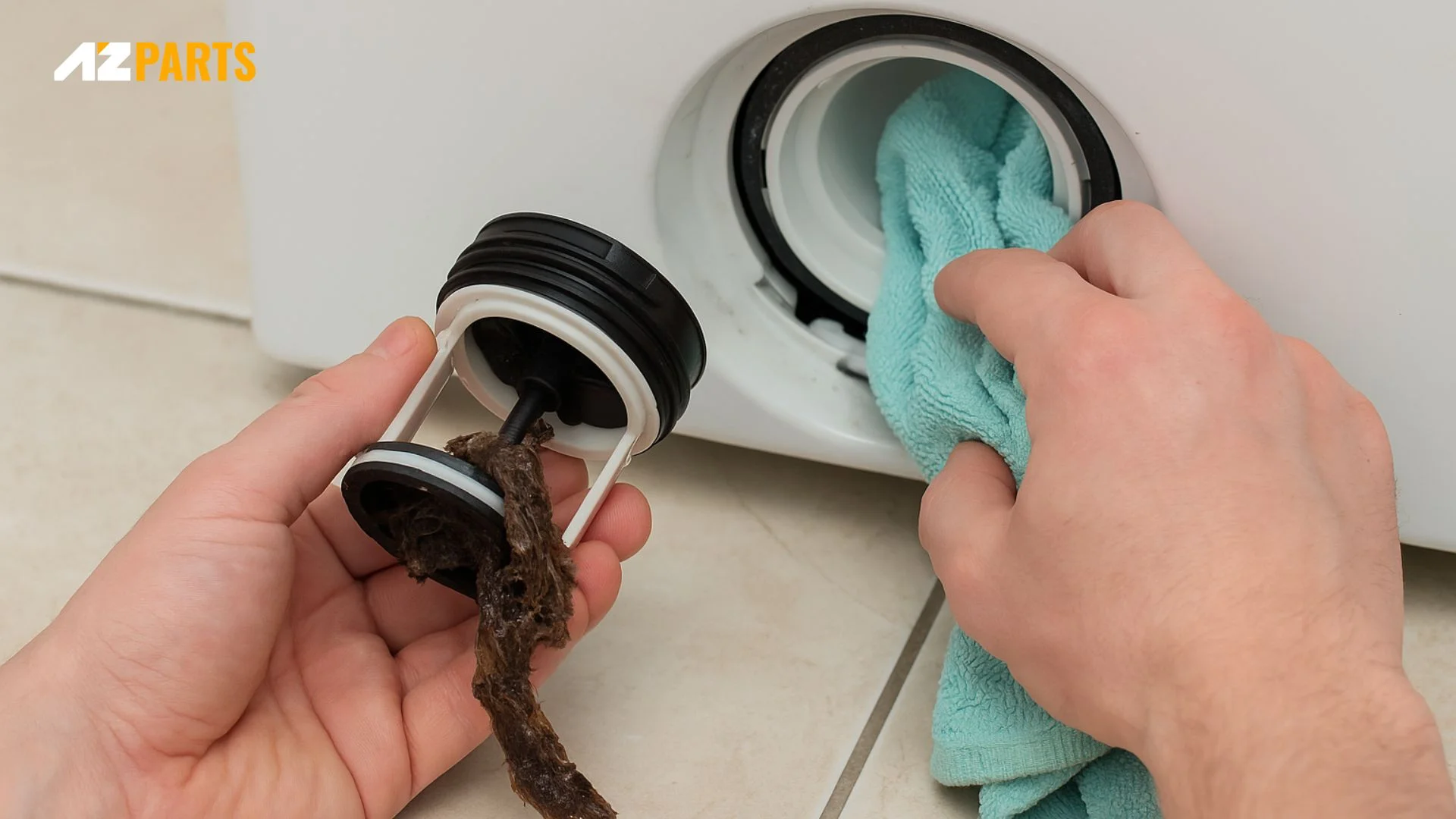
Cleaning the drain pump and filter prevents clogs and ensures smooth spinning. (Source: AZParts)
2.3. Clothing Between Tubs
Occasionally, small garments like socks or thin fabrics can sneak through the drum holes and get stuck between the inner and outer tubs. When this happens, the washer may become unbalanced or struggle to spin properly. You might notice unusual thumping sounds or resistance when turning the drum by hand.
How to fix: If you suspect clothing is stuck between tubs, avoid forcing the drum. Contact a professional technician to disassemble the unit and safely remove the blockage. Prevent future issues by using mesh laundry bags for small items during washes.
2.4. Clutch Issues
The clutch helps your washer gradually reach full spin speed. If it’s worn out or slipping, your washer might spin slowly or not at all. This is especially common in top-loading models with heavy use.
How to fix: Watch for signs like a burning smell or noisy spin cycles. If you suspect clutch trouble, consider inspecting or replacing the washing machine clutch band. You can find compatible replacement parts at AZParts to restore proper spin performance.
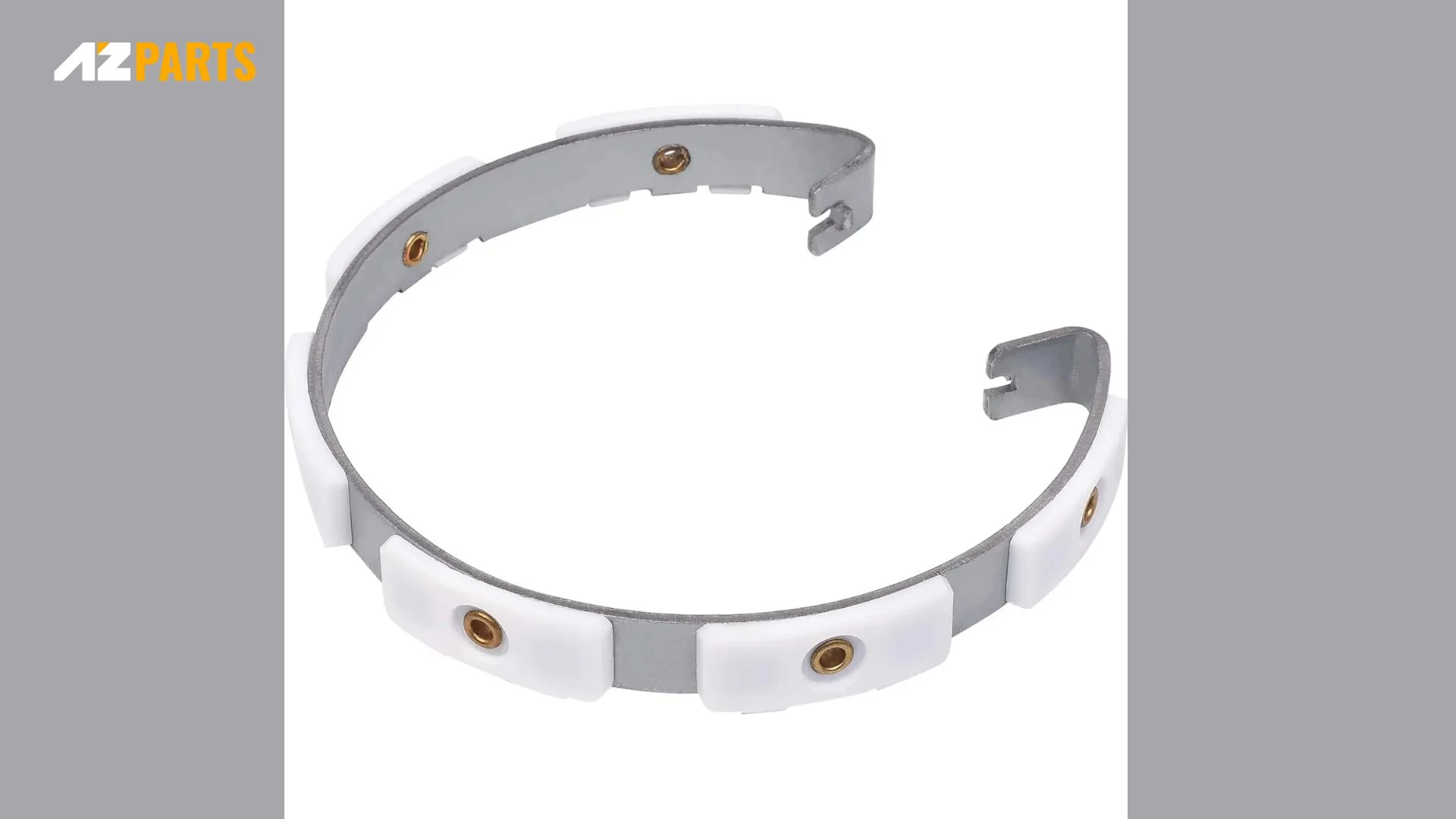
Replace washing machine clutch band if it’s old (Source: AZParts)
2.5. Drive Belt Problems
The drive belt is what transfers power from the motor to the drum, making the spin cycle possible. Over time, it can stretch, crack, or snap together, causing your washer to spin slowly or not at all.
How to fix: Look for signs like squealing noises or a loose drum. Tip the washer slightly and inspect the belt for wear or slack. If it’s frayed or broken, replacement is necessary. Installing a quality washer drive belt at AZParts ensures smoother spins and helps extend your washer’s lifespan.
2.6. Coupler Troubleshooting
The motor coupler (or agitator coupler) connects the motor to the drum. If this small part is broken or worn out, your washer may stop spinning or make strange noises. This usually happens over time from regular use or when the machine is overloaded. Signs of a bad coupler:
- The washer fills and drains, but doesn’t spin
- You hear a clicking or grinding sound during spin
- The drum doesn't move at all during the cycle
How to fix: If you suspect the coupler is damaged, it may need to be replaced. It's a small but important part and replacing it can get your washer spinning again. You can find a compatible washer agitator coupler for your machine at AZParts, where quality replacement parts are easy to order.
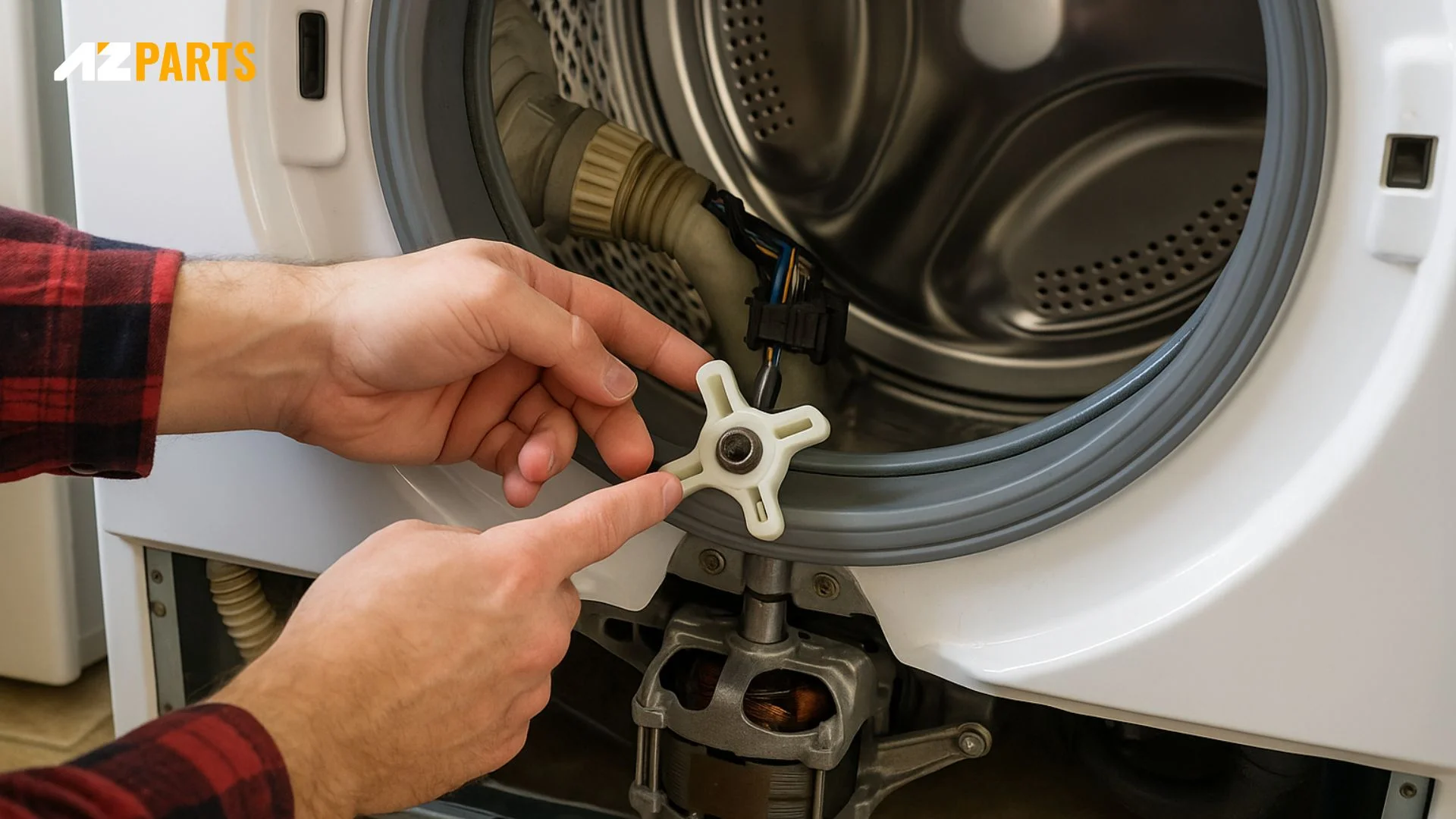
Worn-out motor coupler causing slow spin in washer (Source: AZParts)
2.7. Motor Problems
The motor is the main part that makes your washing machine spin. If the motor isn’t working properly, your washer might spin very slowly or not spin at all. This can happen for a few reasons, such as:
- The motor brushes are worn out
- The motor is burned out
- There are problems with the wires or electrical parts
When the motor doesn’t run well, the machine can’t spin fast enough to remove water from your clothes. You might also hear a humming sound, or notice that the drum struggles to move.
How to fix:
Motor problems usually require a professional to check. If your washer stops spinning, spins too slowly, or makes strange sounds, it’s a good idea to call a repair technician. They can test the motor and tell you if it needs to be fixed or replaced. Fixing it quickly can help prevent more damage to your washer.
2.8. Damaged Drum Bearings
Drum bearings help the washer drum spin smoothly and quietly. Over time, these bearings can wear out due to regular use, water leaks, or heavy loads. Signs to watch for:
- Loud rumbling or grinding noise when the drum spins
- The drum feels loose or wobbly when you move it by hand
- The spin cycle slows down or stops altogether
How to fix: Worn drum bearings usually need to be replaced. It's a more advanced repair, so professional help is often recommended. Ignoring bad bearings can cause further damage to your washer. Replacing them early can help extend the life of the machine.
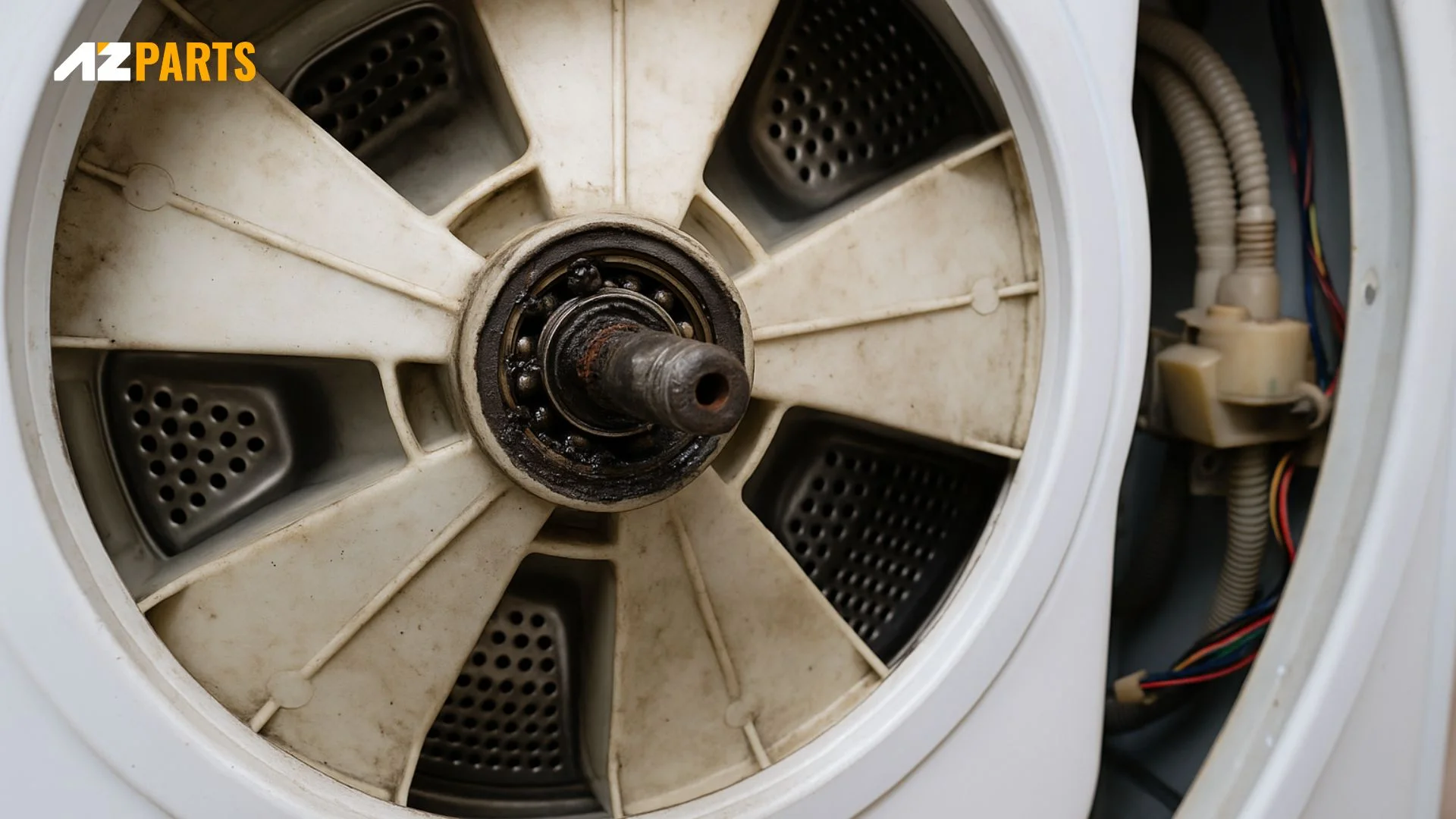
Worn drum bearings cause noise, wobble, and slow spinning (Source: AZParts)
A slow spin cycle can be frustrating, but identifying the root cause whether it’s an unbalanced load, a clogged drain pump, worn-out parts, or motor trouble can help you fix the issue effectively. Regular maintenance and timely replacement of key components like belts, couplers, or filters can keep your washing machine running smoothly. If you're looking for reliable replacement parts, AZParts offers a wide range of quality washer parts, from agitator couplers to pump filters and more, helping you restore performance without the guesswork.
Contact Information:
8 The Green, Ste A, Dover, Delaware 19901-3618, United States
Discover more common washer issues and how to fix them here:
Washer
Further Reading
Further Reading


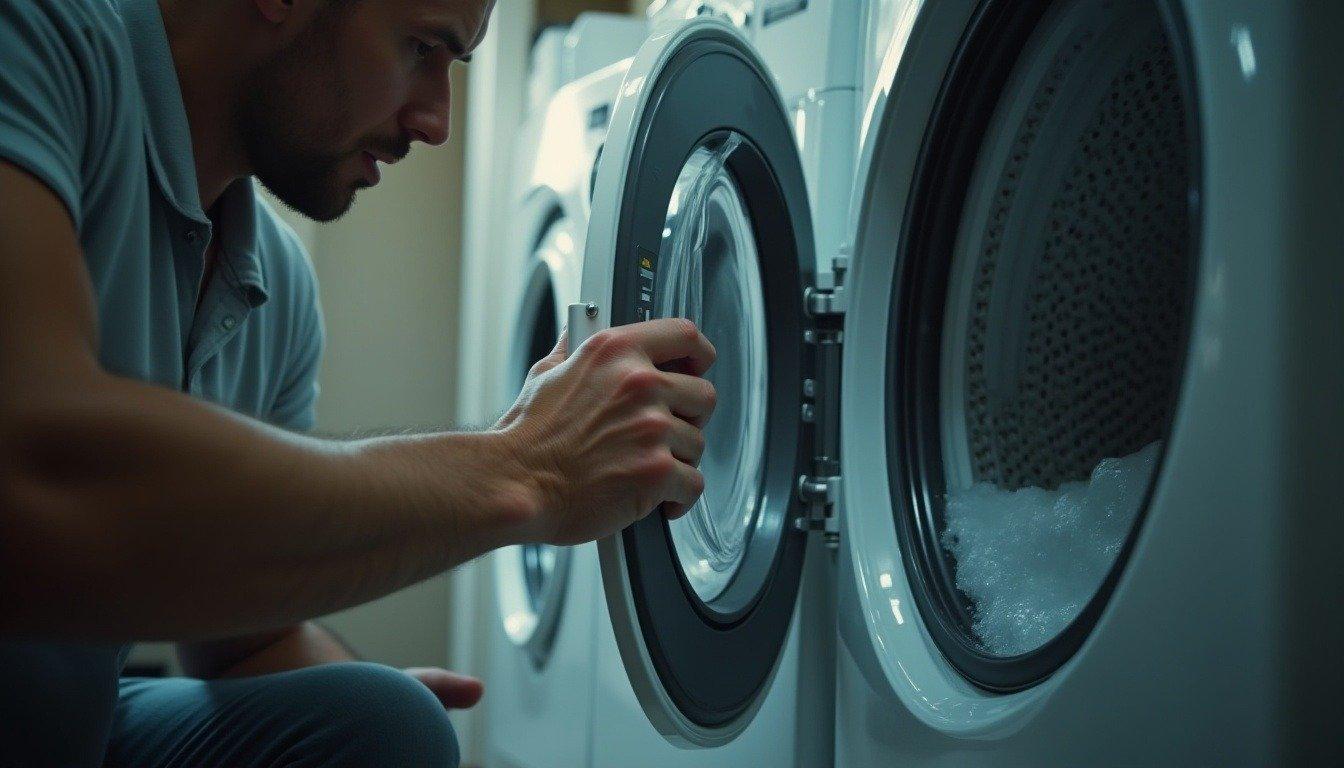


_1748341252.jpg&w=3840&q=75)